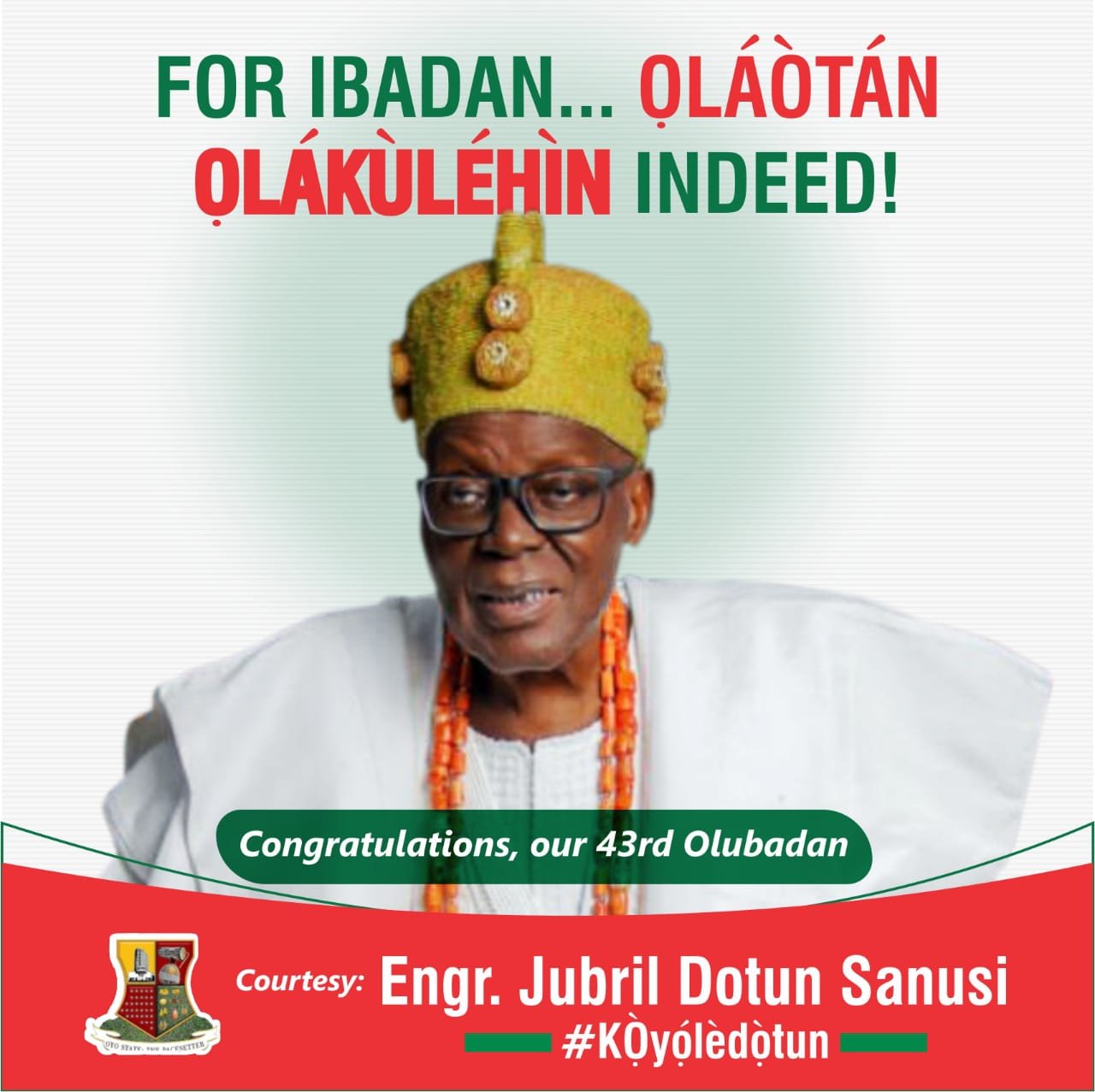Popular Ibadan-based photographer, Pa David Owolabi Ositelu, better known and called “BORN PHOTO”, is dead.
According to Oloye ‘Lekan Alabi, Ekefa Olubadan of Ibadanland, who made this known on behalf of the deceased family, the Ogere Remi-born elder statesman “died peacefully in his Isale-Osi,Ibadan studio this afternoon. He was aged 86,having been born on 25th December,1935,in his hometown, Ogere Remo,Ogun State.
———————————-
Pa David Owolabi Ositelu, popularly known as ‘Born Photos’, has been a celebrated photographer who started his profession during the Old Western Region. His competence as photographer brought his services to the tables of foremost politicians, statesmen and even the military since 1963, eventually leading him to the war front as a war photographer during Nigeria’s Civil War (1967-1970). In this interaction with Nigerian Tribune’s duo of KEHINDE OYETIMI and ‘LAOLU AFOLABI, the octogenarian shares his passion, life and legacies.
Why are you are generally referred to as ‘Born Photos’
I am known as ‘Born Photos’ Ositelu. This is what people know me as. When I go to the bank, my account details read ‘Born Photos’. Even whenever I am summoned in court, I am known as ‘Born Photos’. The judges know me as ‘Born Photos’. So what else do you want me to say? That alias has made me popular. I started my photography profession a long time ago. I have gained popularity and prestige through this. My parents never named me ‘Born Photos’. God nicknamed me ‘Born Photos’ and this stuck all through the years. One must believe in God who is the Supreme Being. God gives direction to those who seek him. God gave me that name: ‘Born Photos’.
You must be aware that this photography profession which I started over six decades ago has been impactful. I have repeatedly gotten recognitions from Nigerians abroad and this is so rewarding to say the least.

What year did you start your photography profession and why did you choose the profession?
I got trained in photography at Oke Bola, Ibadan. Before my training, I was attending Boys’ High School in Lagos. I am a native of Ijebu in Ogun State but I was born at Agege, Lagos. Of course, my parents are Ijebu, Ogere Remo. I am from the Ositelu family, which is very popular in that area of Ogun State. The present Tabieorar ministry at Ogere was founded by Baba who was from my paternal side. Today, we are proud founders of that Christian ministry. But today, Ositelu has many ‘branches’ and offspring; some are in London, the United States of America, and in various parts of Nigeria. They are doing well.
My education started in Agege. I attended Bishop Oluwole Memorial School, Agege. But I was very stubborn while growing up and so at a point, I was forced to attend a school for juvenile delinquents at Isheri.
I went into photography after I left school at Agege. There, at Agege, I was living with an older male relative. After a while, he decided to get married; he informed me that he would be unable to continue funding my education. My school fee then was about a pound and two shillings, which was about N20 (twenty naira). My parents lived close by but I was living with the older relative. I lived with him because he was living alone before he got married. My parents felt it was only appropriate that I lived with him. It was his inability to continue with the payment of my school fees that led him to bring me to Ibadan to learn photography. God knows all things. He knows the end from the beginning. Perhaps if I had continued in Lagos, and if my uncle never got married, I would not have gone into photography and the popularity and prestige that I enjoy today would have been lost. Providence was working in my favour.
I learnt photography at Agbokojo, Oke Bola, Ibadan. I had never been to Ibadan before then. It was my first time. My uncle’s fiancée lived in Ibadan then and my uncle would come to Ibadan on weekends to visit. He got to know a photographer in Ibadan during his several visits and therefore it was convenient for him to hand me over to the photographer for training. However, I suffered a lot during apprenticeship. Agbokojo then was very dirty as a community. It lacked basic amenities. There were toilets so many of the residents defecated openly; the whole place stank badly. I started apprenticeship in 1956; some apprentices were in training for as long as four, five years. I spent almost four years in training.
Why did you take that long in training?
The photographers that are around today are badly trained. This is reflected in the quality of their work. But in my days, training was very important. It was either you were ready to be properly trained or not. There were no two ways about it. Today, look at the quality of pictures taken and you will be sad. Put a black and white photograph in your pocket and also place a colour picture in the same pocket, and then go in the rain. You will find out that the black and white photo would retain its quality while the other one would lose its.

Can you recollect some prominent Nigerians or foreign personalities whose pictures you took since you started your career in 1960?
Let me quickly mention that I once worked as a dispatch rider. I was given a motorcycle. I couldn’t afford a camera then and so I had to work as a dispatch rider then. I couldn’t take pictures in 1960 because I could not afford a camera. It was in 1963 that I could eventually afford to buy a camera, and so that year I started my photography business. I bought my first camera for 34 pounds. But before then, I suffered a lot to raise that money. It was N68 (sixty-eight naira then).
Some of the prominent Nigerians who patronized me included Chief Obafemi Awolowo, Chief Akintola, Tai Solarin, and many others. In the Old Western Region, there was no school where my photography services were not needed. In those days, aside taking passport photographs, I also covered inter-house sport competitions in schools. It was everywhere. Many ladies in those schools would throng my shop here to get copies of their photographs. It was always like a carnival. People would invite me to birthday, marriage and other various occasions. These things are memories that I cherish till today. I must also mention that I never got into trouble with any of my customers.
We gathered that you actively participated as a frontline photographer during Nigeria’s Civil War. What gave you such impetus?
I am proud to refer to myself as a war photographer. Nigeria’s Civil War started in 1967 and ran through till 1970. In 1967, something remarkable happened to me which made me a war photographer. It is good to be competent. Various military trainings were going on then prior to the war. We had First Division, Second Division and Third Division then in the military. I served as a photographer with the Second Division of the Nigerian Army during the Civil War. I even had meals alongside then General Olusegun Obasanjo at the popular Onitsha Bridge during the civil war.
But how did this happen? In 1967, I had a female client who particular interest in my work. She lived around the University College Hospital, then. She would come to my shop and take pictures. She really loved my photo productions. But she got to know an Ogbomoso-born military commander called Colonel Adeniran. They were romantically involved. When Colonel Adeniran saw some pictures with this lady, he was superbly impressed by the quality. So he requested that he be brought to the photographer; this lady brought the colonel to my shop. Colonel Adeniran demanded that I took some portraits of him which I did. I was also delighted to have a top military officer as a client and so I did everything to please him. After I produced his pictures, he was very happy. His delight knew no bounds. That became the beginning of my journey to the war front.
Immediately, Colonel Adeniran informed me: “You are joining me at the war front. You will be in charge of taking all the pictures that will be sent to the military high commission in Lagos.” That was how I was taken.

Did you inform your family that you were going to the war front?
I did not. I saw no reason to. I was reckless. I went to Abeokuta. Of course the war had started. At Abeokuta, Colonel Adeniran informed me that we were travelling the next day to the battle front. He gave me a rifle and I was taught to aim and shoot. I was given a military uniform, which I wore. I was not scared.
Can you still shoot?
Give me a gun and I will put a bullet in your chest!
What happened at the war front?
The war was terrible. At the Niger Bridge, we made camp and continued taking territories for the Federal Government. After exhausting rounds of photo films, the rolls were sent to Lagos where they were printed. The soldiers took care of that. The pictures were published in the newspapers each day and they showed every territory that was conquered for the Federal Government of Nigeria.

Were you not scared of death?
I am also death; I was reckless. I had no reason to shoot because I was also with the commandants at that time. My wife just heard that I had gone to join the war. I did not verbally inform her. I was at the war front from 1967 to 1970 when the war ended. The greatest day of my life on the battle front was when we were signaled that the war had ended. Oh how we danced in the forest! To keep Nigeria one is a task that must be done! That expression has not left my consciousness till today.
How did people receive you when you returned to Ibadan after the war?
I became a war hero. When I came back here, four military Land Rover jeeps accompanied me. I was in my military uniform. I had military officers who followed me about for some time. I was very proud. My family was proud.
Is any of your children taking after this profession and how do you cope now at almost 90?
None of my children is taking after this. Again, it is not easy coping with the new technologies that have come with photography but I am forced to adapt and I have been doing that. I still take pictures.
































